From October 31 to November 1, 2025, the "2025 International Conference on Innovation and Knowledge Management (iKM2025)", co-hosted by the by the Research Center for Technological Innovation of Tsinghua University, the Business School of Shenzhen Technology University, and Tongfang Knowledge Network Digital Publishing Technology Co., Ltd., grandly opened at Shenzhen Technology University. Scholars and practitioners from the universities and companies gathered together to conduct in-depth dialogues and ideological exchanges around the theme of "Innovation and Knowledge Management for the Modern Industrial System".
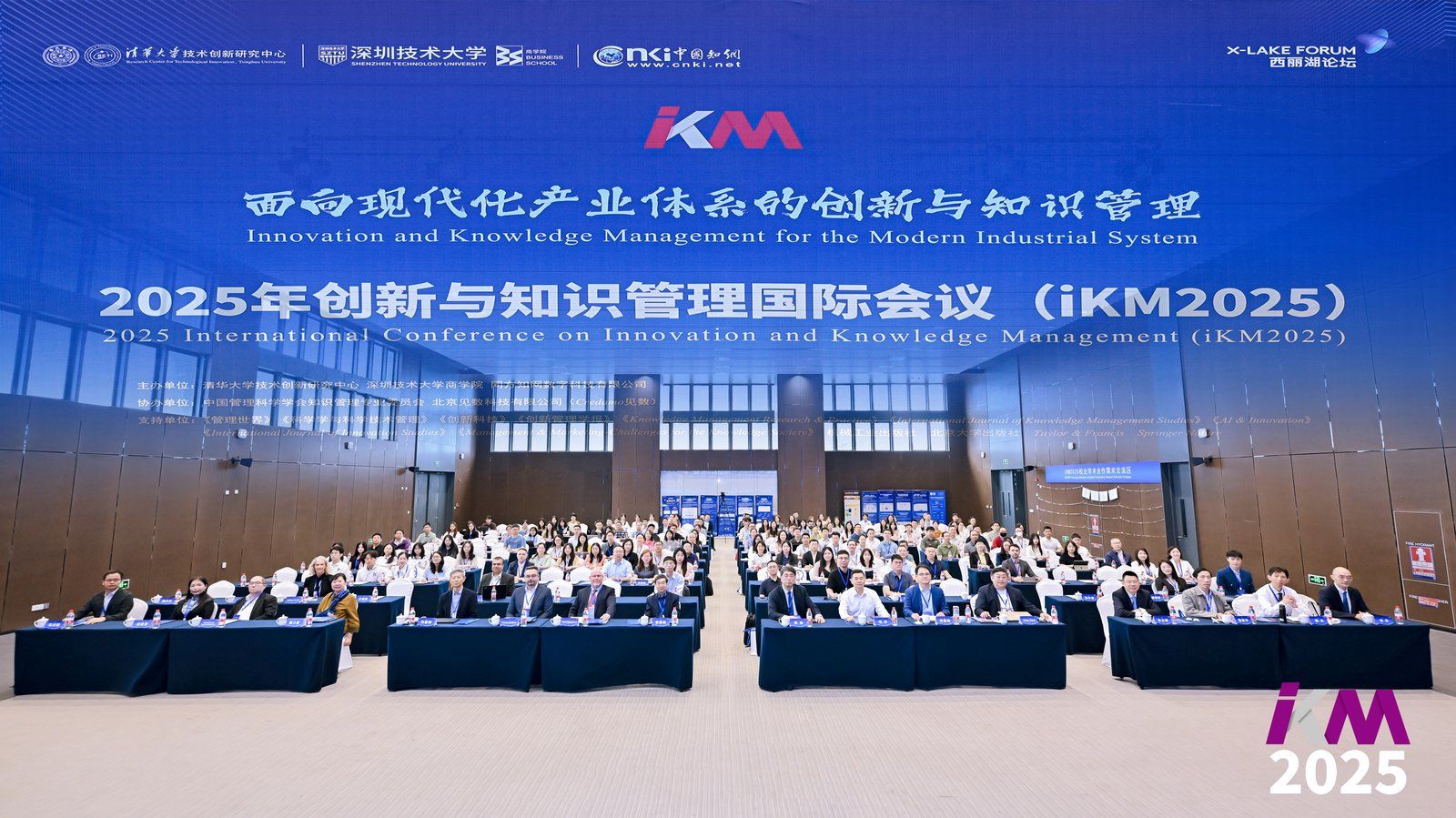
Group photo of the attendees
Opening Ceremony
The opening ceremony was hosted by Professor Li Jie, Vice Dean of the Business School of Shenzhen Technology University. Professor Ming Zhong, Member of the Party Committee and Vice President of Shenzhen Technology University, delivered the opening speech. He stated that as a new applied science university, Shenzhen Technology University has always focused on industrial needs and technological innovation. This conference has built a high-end communication platform for the global knowledge management field, and he looks forward to taking the conference as a platform to deepen international cooperation and promote the transformation and application of innovative achievements.
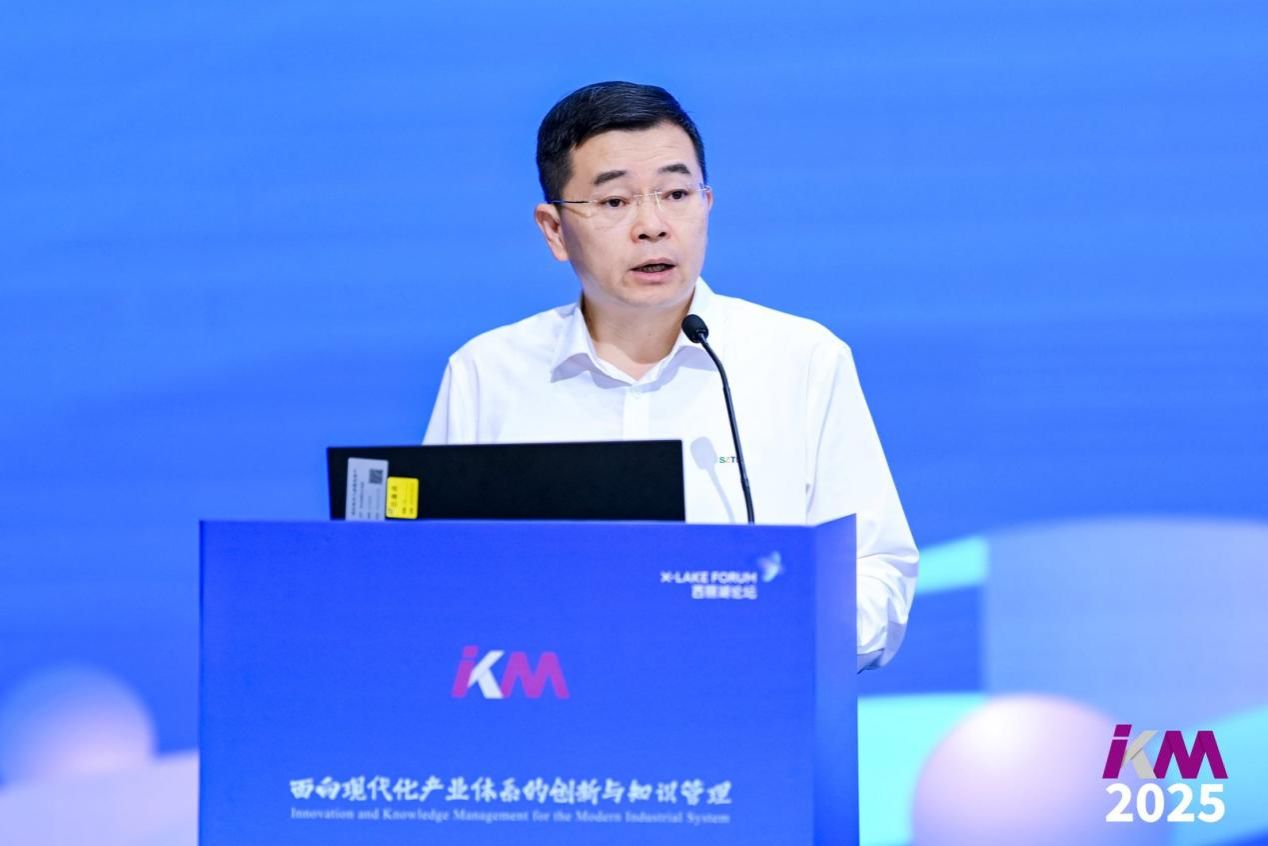
Welcome Address by Prof. Ming Zhong, Member of the Party Committee and Vice President of Shenzhen Technology University
In his welcome speech, Professor Chen Jin, Conference Chair and Director of the Research Center for Technological Innovation of Tsinghua University, pointed out that innovation is the core driving force for social progress, and knowledge management is the foundation for achieving sustained innovation. He called on the academic and industrial communities to jointly explore a "people-oriented" innovation model and promote knowledge management from a closed system to an open ecosystem.
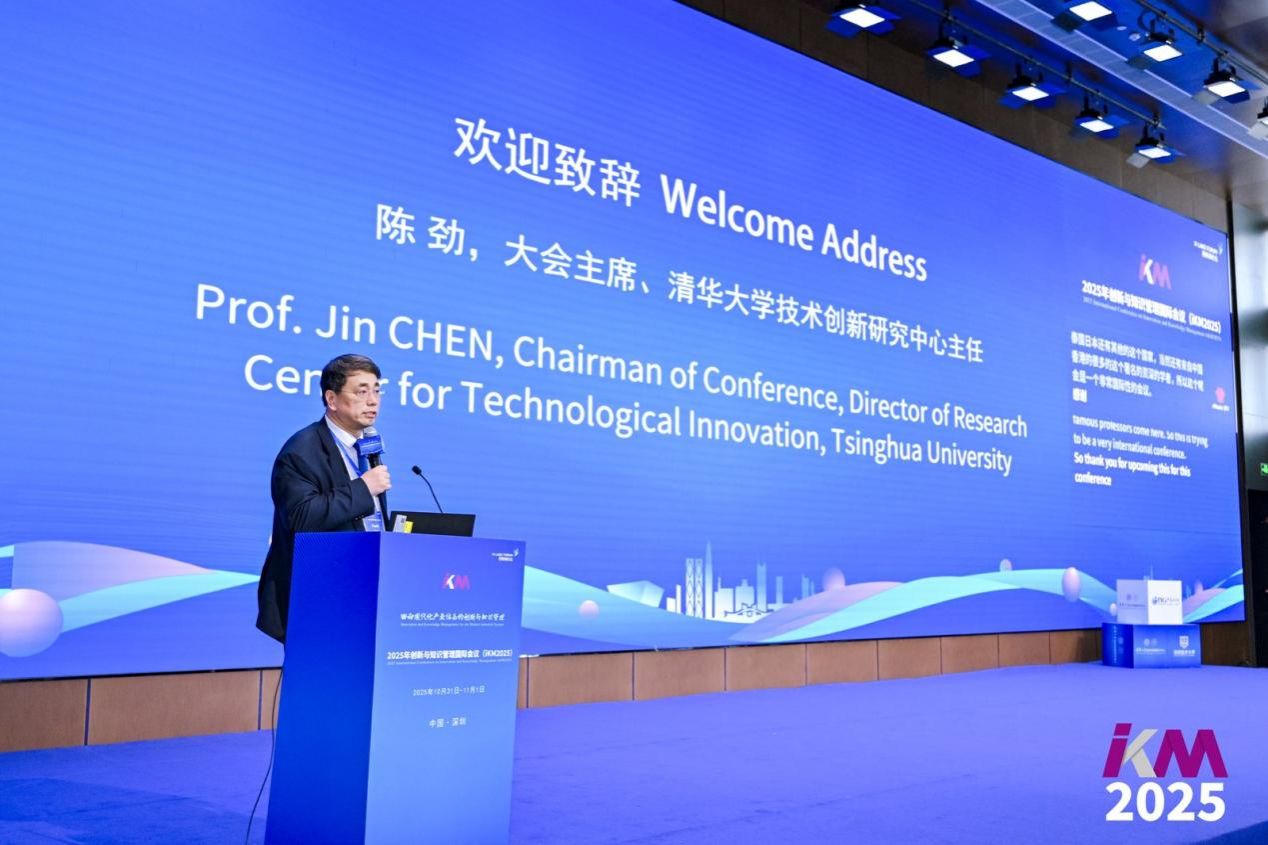
Welcome Address by Prof. Chen Jin Director of Research Center for Technological Innovation of Tsinghua University
Dr. Ke Chunxiao, Member of the Party Committee and Deputy General Manager of CNKI, emphasized that with artificial intelligence sweeping the globe today, knowledge management is undergoing profound changes. He stated that CNKI is committed to building a global and intelligent knowledge infrastructure, promoting knowledge services from information integration to cognitive empowerment. This effort helps various organizations achieve efficient knowledge aggregation, intelligent mining, and value transformation, thereby empowering the digital and intelligent transformation and upgrading of industries.
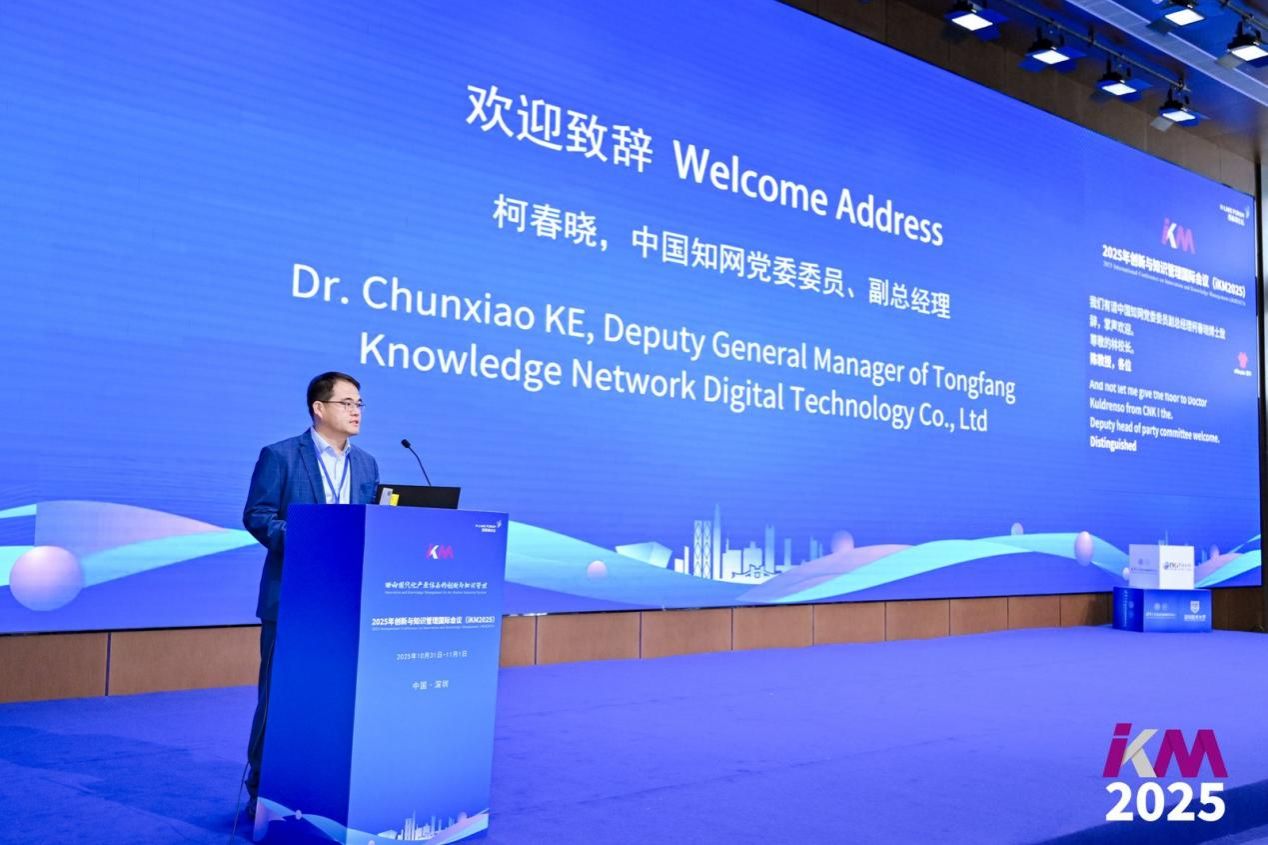
Welcome Address by Dr. Ke Chunxiao, Member of the Party Committee and Deputy General Manager of CNKI
Keynote Speech (I)
Professor Eric Tsui from The Hong Kong Polytechnic University, Vice President of the International Knowledge Management Association chaired the first keynote speech session. Professor Chen Jin from Tsinghua University delivered a speech titled "Technological Innovation Based on Original Knowledge and Predictive Knowledge". He systematically expounded on the transformation from the producer innovation paradigm to the non-producer innovation paradigm, and emphasized that the independent acquisition and application of knowledge from the people is the focus of knowledge management. At the same time, forward-looking and pioneering knowledge formed based on abductive reasoning and strategic insight is more conducive to building knowledge exploration capabilities. Professor Chen Jin's speech not only focused on the deepening of Professor Ikujiro Nonaka's knowledge spiral model, but also proposed a new concept of "diachronic knowledge management".
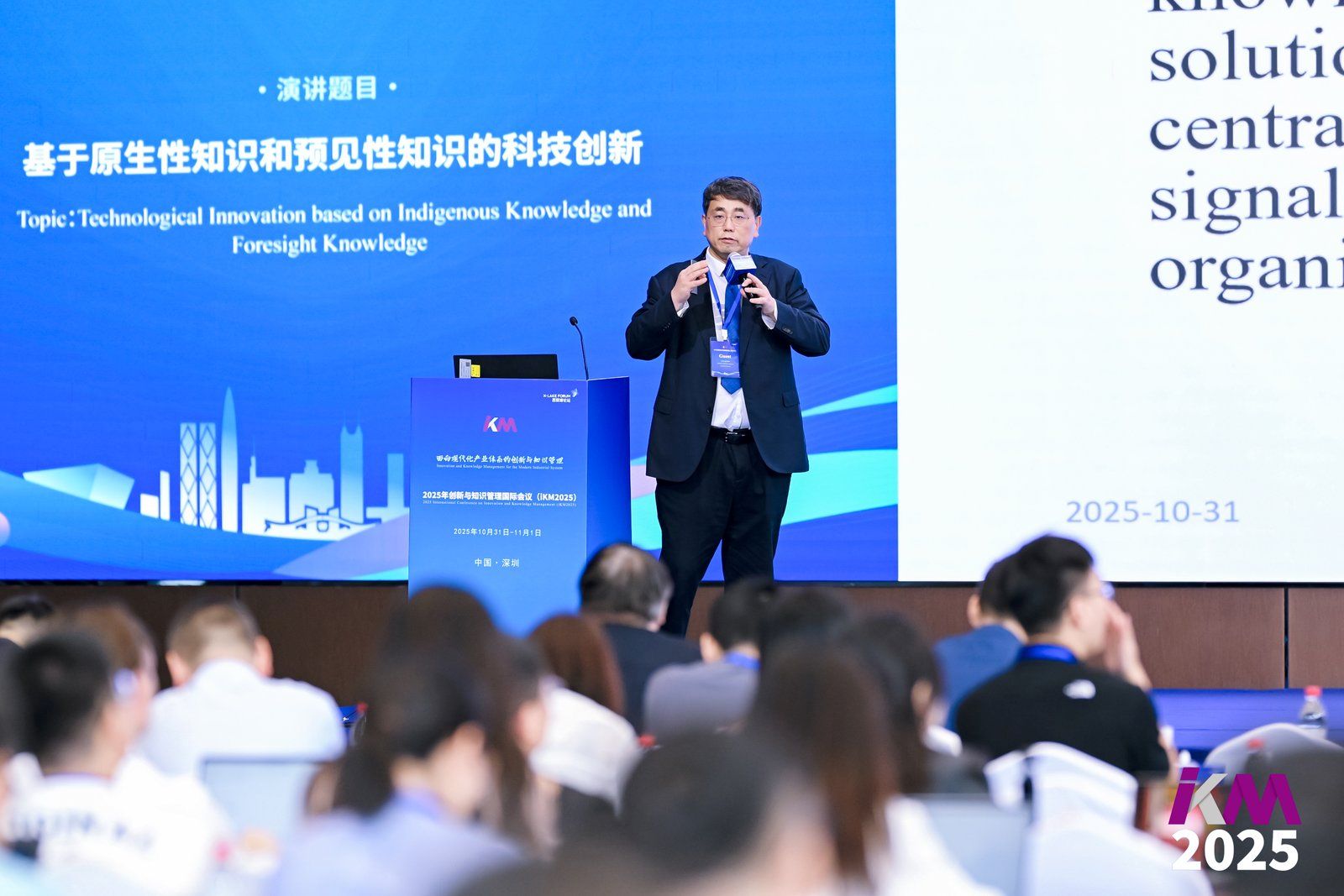
Professor Chen Jin from Tsinghua University delivers a keynote speech.
Professor Mats Gottfrid Magnusson from the KTH Royal Institute of Technology in Sweden shared insights around the topic "Shaping Innovation Strategies for Standard-based Innovation Management Systems - Opportunities and Challenges". He conducted an in-depth analysis of the application of the ISO 56000 series standards in innovation management, proposed a "Dual Innovation Strategy" framework, and provided systematic ideas for corporate innovation management.
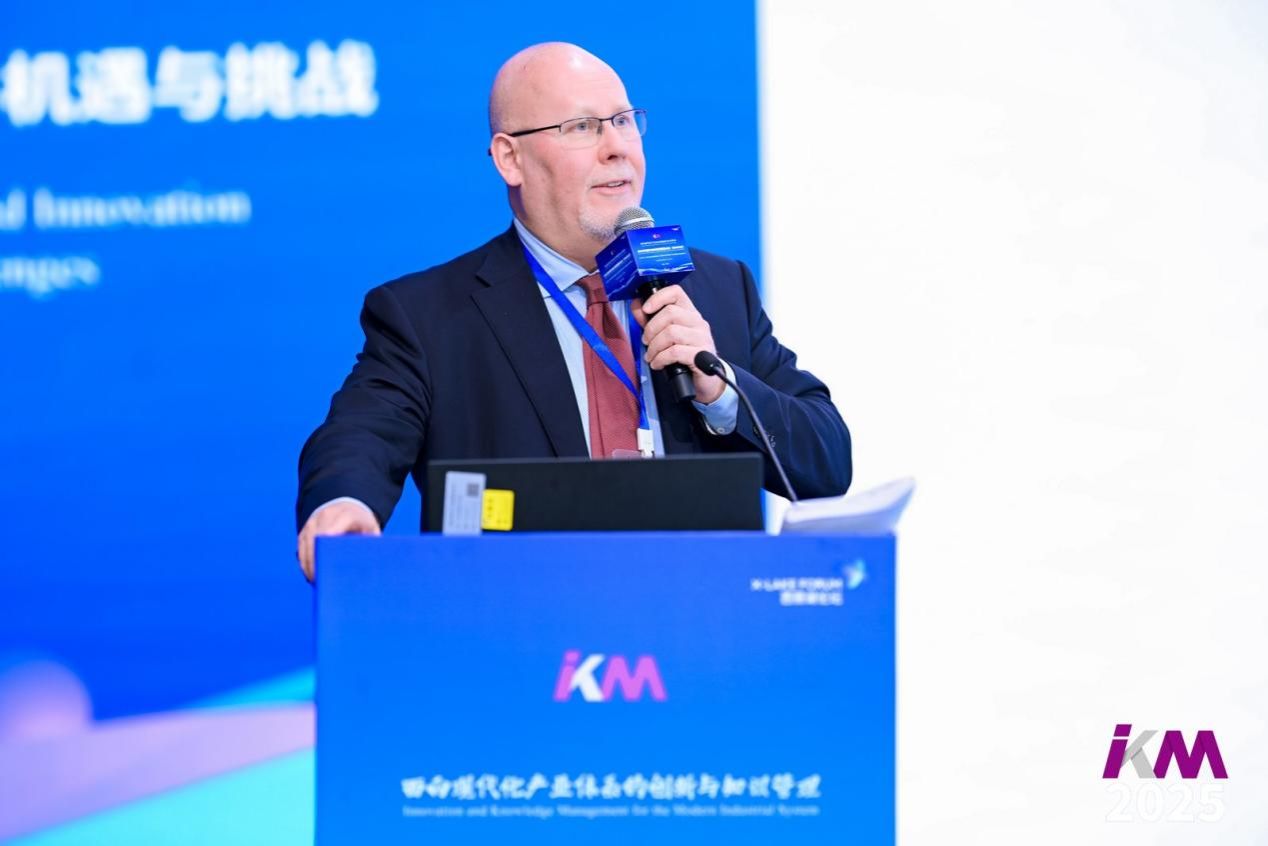
Professor Mats Gottfrid Magnusson from KTH Royal Institute of Technology delivers a keynote speech
Dr. Zhu Lifeng, President of the Guangdong Data Element Industry Association, shared "Innovative Practices of Industrial Knowledge Management in the Industrial Internet Scenario" He elaborated on the paths and effects of industrial technology softwareization, and emphasized the key value of high-quality datasets and vertical models in industrial intelligence.
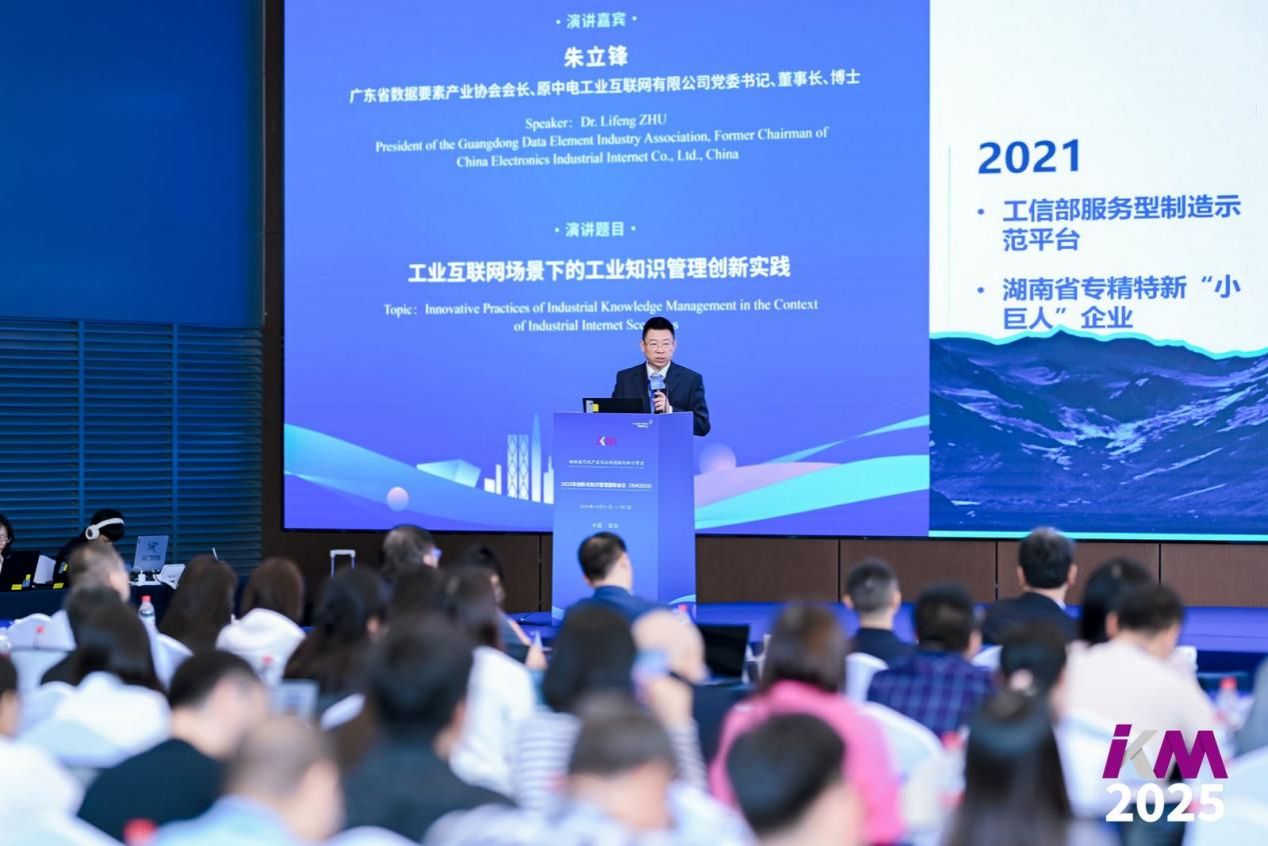
Dr. Zhu Lifeng, President of Guangdong Data Element Industry Association, delivers a keynote speech.
Professor Cheng Yun, Vice Dean of the Business School of Shenzhen Technology University chaired the second part of the keynote speech in unit I . Professor WB. Lee from The Hong Kong Polytechnic University delivered a speech titled "Future of Corporate Learning and its Ecosystems". He conducted an in-depth analysis of the impact of AI on knowledge management and corporate learning paradigms, and proposed that enterprises should build more dynamic and collaborative learning ecosystems in the future.
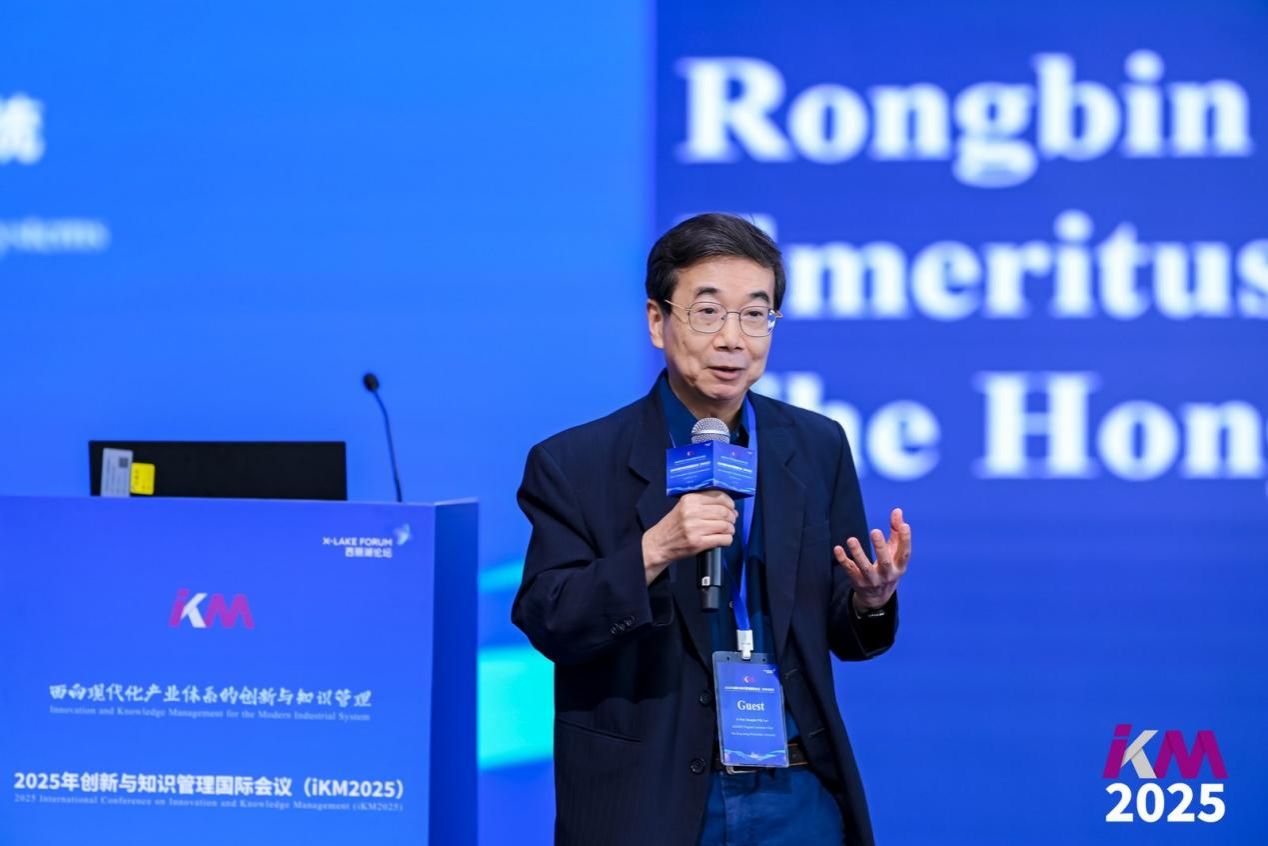
Professor WB. Lee from The Hong Kong Polytechnic University delivers a keynote speech.
Professor Dong Xiaoying from Peking University delivered a speech titled "Expanding Industrial Innovation Space with Knowledge Advantages". From four dimensions—industrial chain, ecosystem, emerging business formats, and future industries—she systematically expounded on the strategic role of knowledge management in industrial innovation and proposed the theoretical framework of the "Dual Knowledge Innovation System".
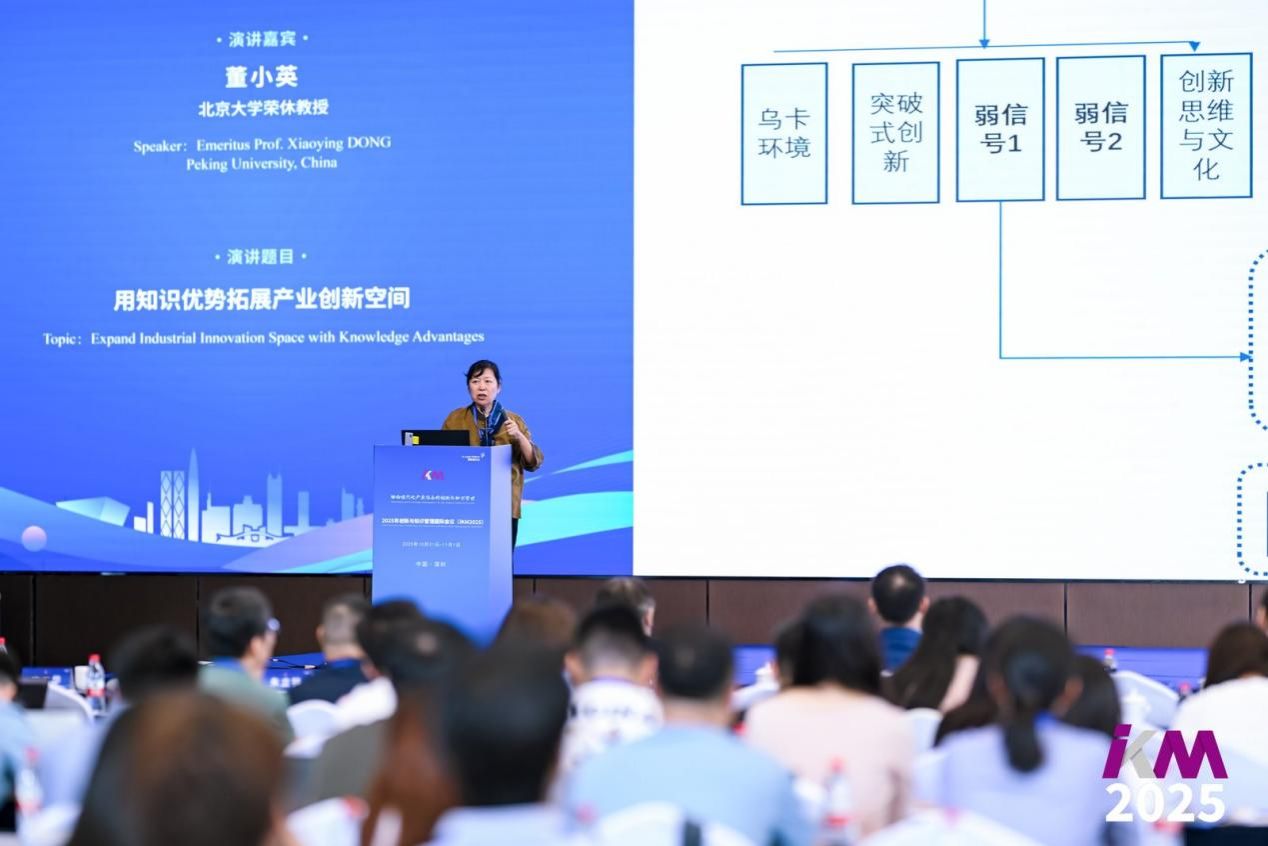
Professor Dong Xiaoying from Peking University delivers a keynote speech.
Deputy General Manager Dr. Ke Chunxiao from CNKI delivered a speech titled "Systematic Management Thinking Behind Enterprise Architecture Theory". He systematically sorted out the development context of enterprise architecture theory, and expounded the management logic behind the theory from aspects such as environmental changes, dilemma problems, management concepts, and theoretical iterations. Taking systematic thinking as the main thread, he conducted an in-depth analysis of the integrity, structure and dynamics of the 4A architecture, and summarized systematic management thinking into three aspects: holistic perspective, structural control, and dynamic evolution. Combined with the digital transformation practices of enterprises in industries such as energy, he discussed in depth the core value of systematic management thinking in enterprise architecture governance, and pointed out that systematic management thinking is the core engine of digital and intelligent transformation, providing important references for the systematic innovation of enterprises.
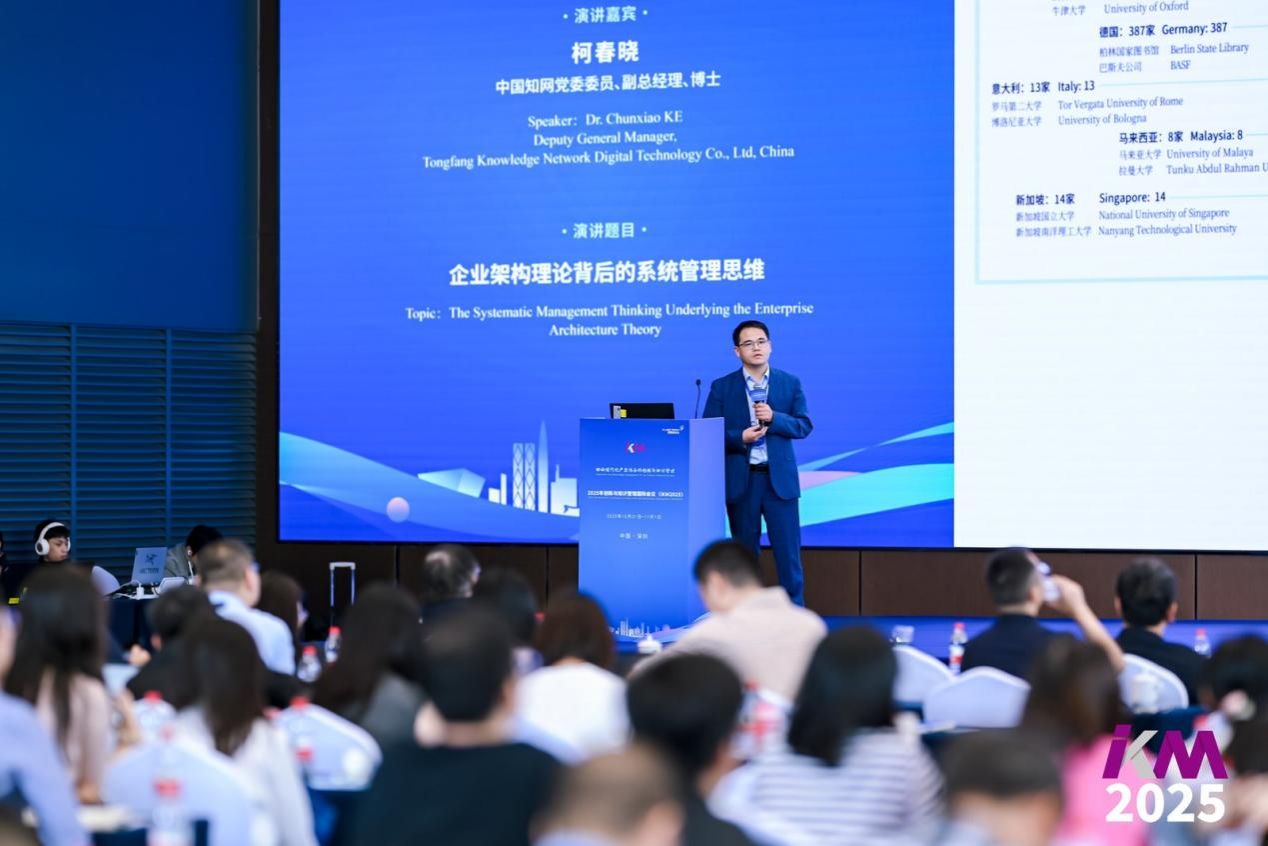
Deputy General Manager Ke Chunxiao from CNKI delivers a keynote speech.
Corporate Keynote Reports and Forums
Liu Chunfeng, General Manager of the Operation Center and Director of the Technology Center of CIMC shared the exploration and practice of high-quality development in manufacturing enterprises. He proposed that enterprises should adhere to their main business focus, concentrate on core competitiveness, and build sustainable development capabilities through lean operations, technological innovation, and digital transformation. He also emphasized that in the face of global competition, China's manufacturing industry needs to shift from an opportunity-driven model to a quality-driven one, focus on customer value innovation and ecosystem construction, and provide solid support for the development of the modern industrial system.
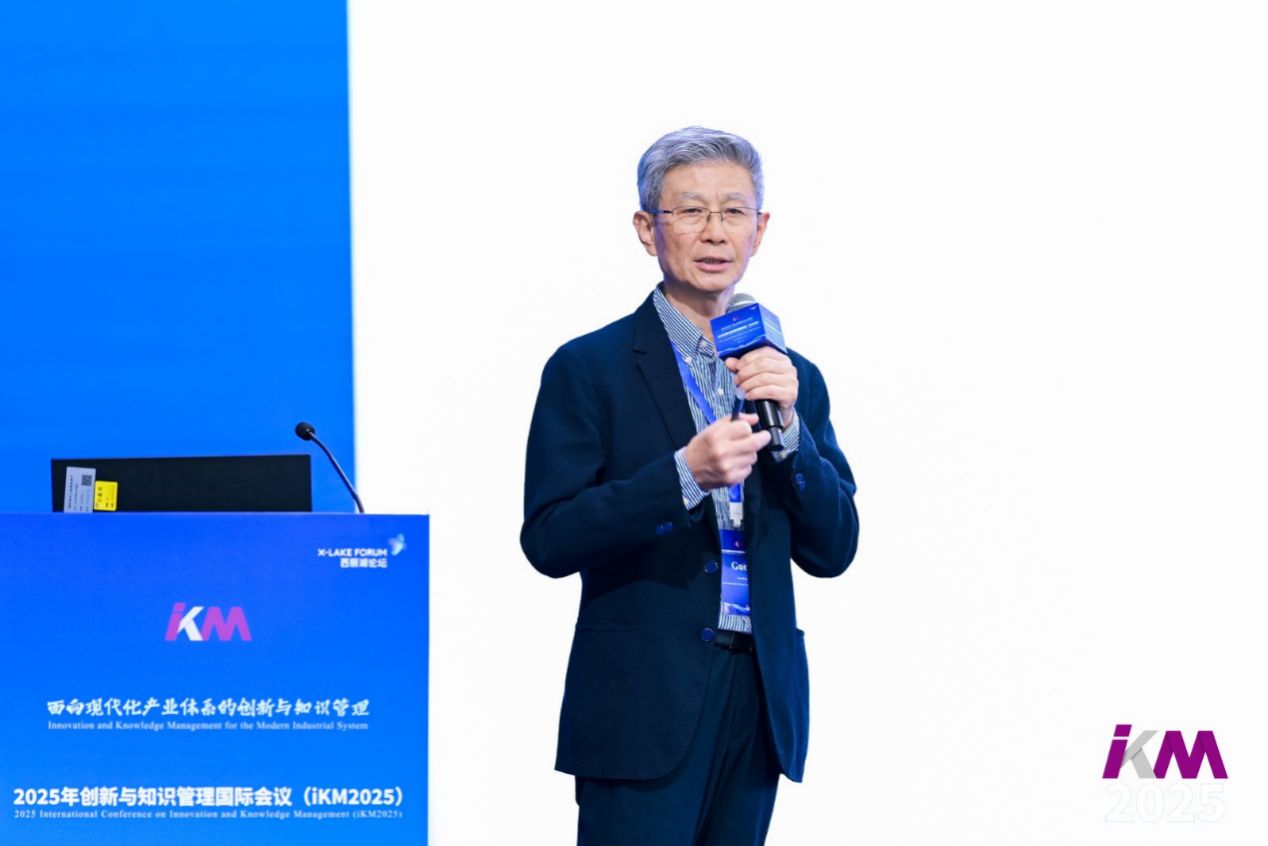
Liu Chunfeng, General Manager of the Operation Center and Director of the Technology Center of CIMC, delivers a keynote report
Dr. He Kaibin, Co-founder ofCredamo, ,shared knowledge management and practice of human-computer interaction. He introduced the exploration of integrating AI with scientific research scenarios, including using large models to generate professional questionnaires, optimizing human-computer interaction effects through A/B testing, and finding that the innovation and supplementary information of AI responses can enhance the reference value of scientific research. He also emphasized that human-computer collaboration is not about replacing humans, but about expanding research boundaries through tool empowerment and providing a new paradigm for knowledge production.
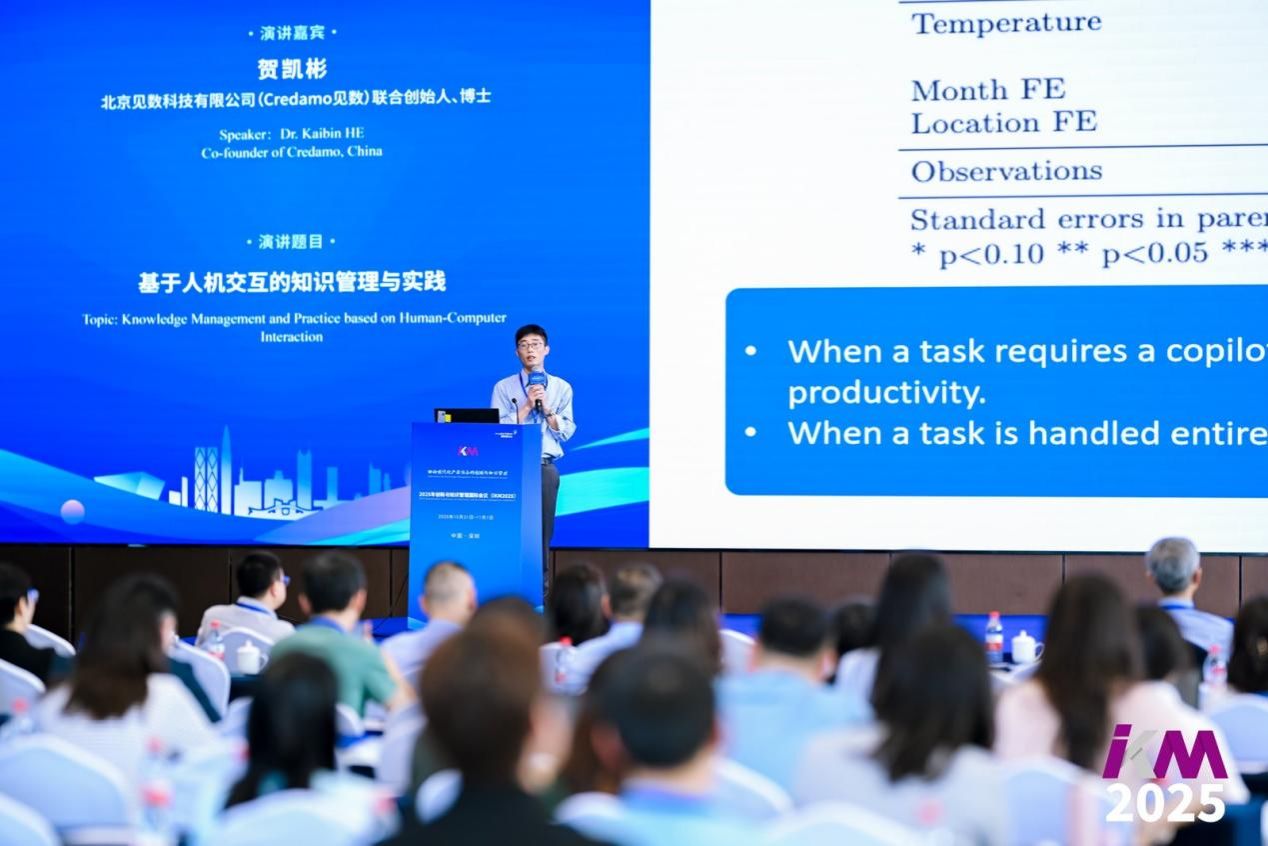
Dr. He Kaibin, Co-founder of Credamo, delivers a keynote speech.
The enterprise forum, themed "Exploration of Industrial Innovation and Knowledge Management Practices", was hosted by Wang Xiaodong, Deputy General Manager of the Marketing Center at CNKI Digital Technology Co., Ltd. This forum focused on the practical implementation of knowledge management in modern industries, empowered by artificial intelligence technology.
Senior experts from industry-leading enterprises—includingElectric Power Research Institute of China Southern Power Grid, CNNC Nuclear Power Operations Co., Ltd., Sinopec Geophysical Research Institute, Sinosteel Safety & Environmental Protection Research Institute, and CNKI Digital Technology[GL1] —shared cutting-edge, first-hand experiences. The discussion topics covered new mindsets for knowledge management in the AI era, the technological evolution of traditional knowledge management systems toward intelligence, the upgrading of corporate knowledge management via vector database technology, and the in-depth application of large AI models in vertical fields such as power grids, nuclear industry, and industrial and trade enterprises.
The forum provided valuable experience references for industry peers and revealed the key value of knowledge management as a core competitiveness of enterprises.
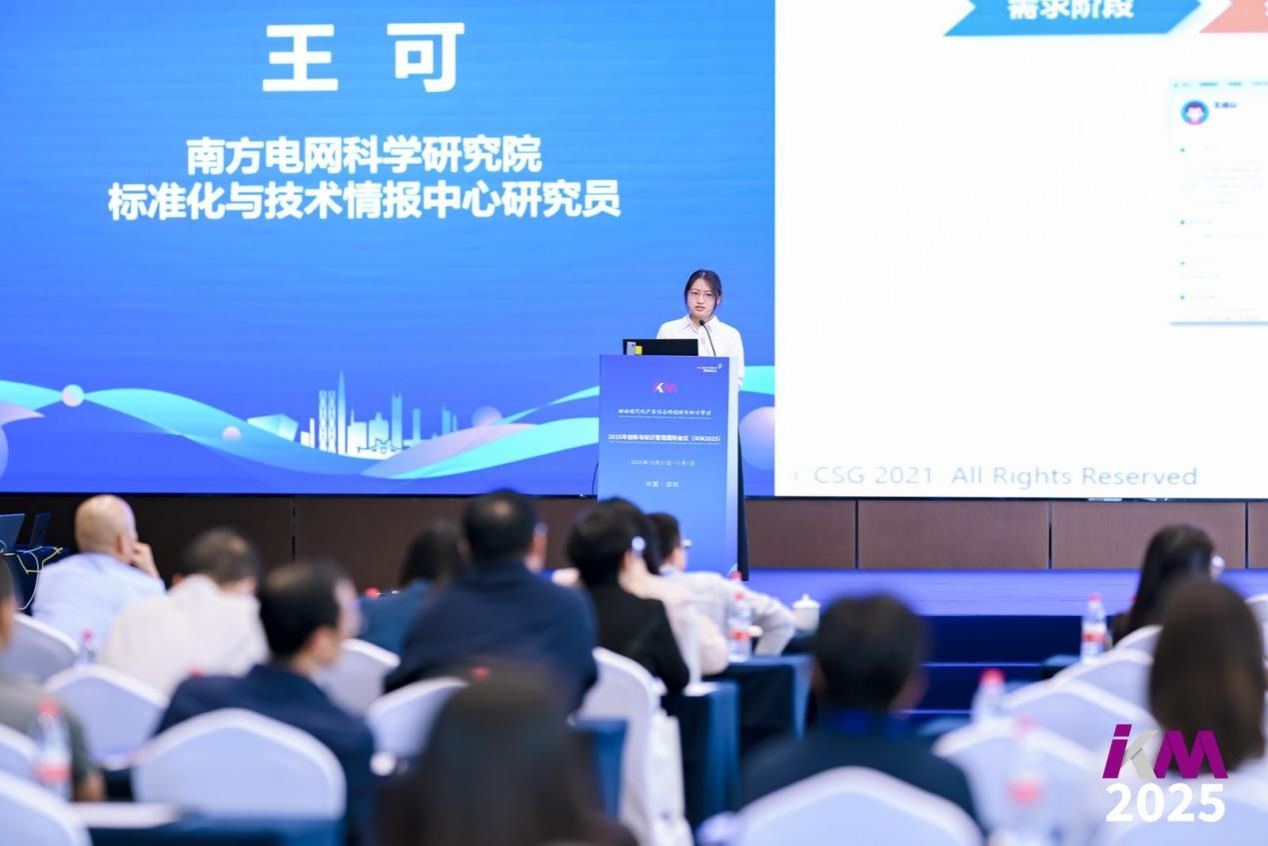
A representative from China Southern Power Grid gives a talk at the forum
Academic Poster Sharing and Voting
During the conference, academic poster sharing and voting session was in a lively atmosphere, serving as a key platform for young researchers to demonstrate their recent research.
Outstanding researchers from many universitiesincluding Tsinghua University, City University of Hong Kong (Dongguan), and Guangdong University of Technology—presented their latest research findings in innovation management, knowledge management, digital transformation, and artificial intelligence applications in their posters.
Conference participants stopped in front of the distinctive posters to conduct in-depth discussions and exchanges with the authors. Sparks of ideas continued to emerge during the interactions, creating a vibrant atmosphere. This effectively promoted ideological collisions and potential collaborations among scholars with different academic backgrounds.
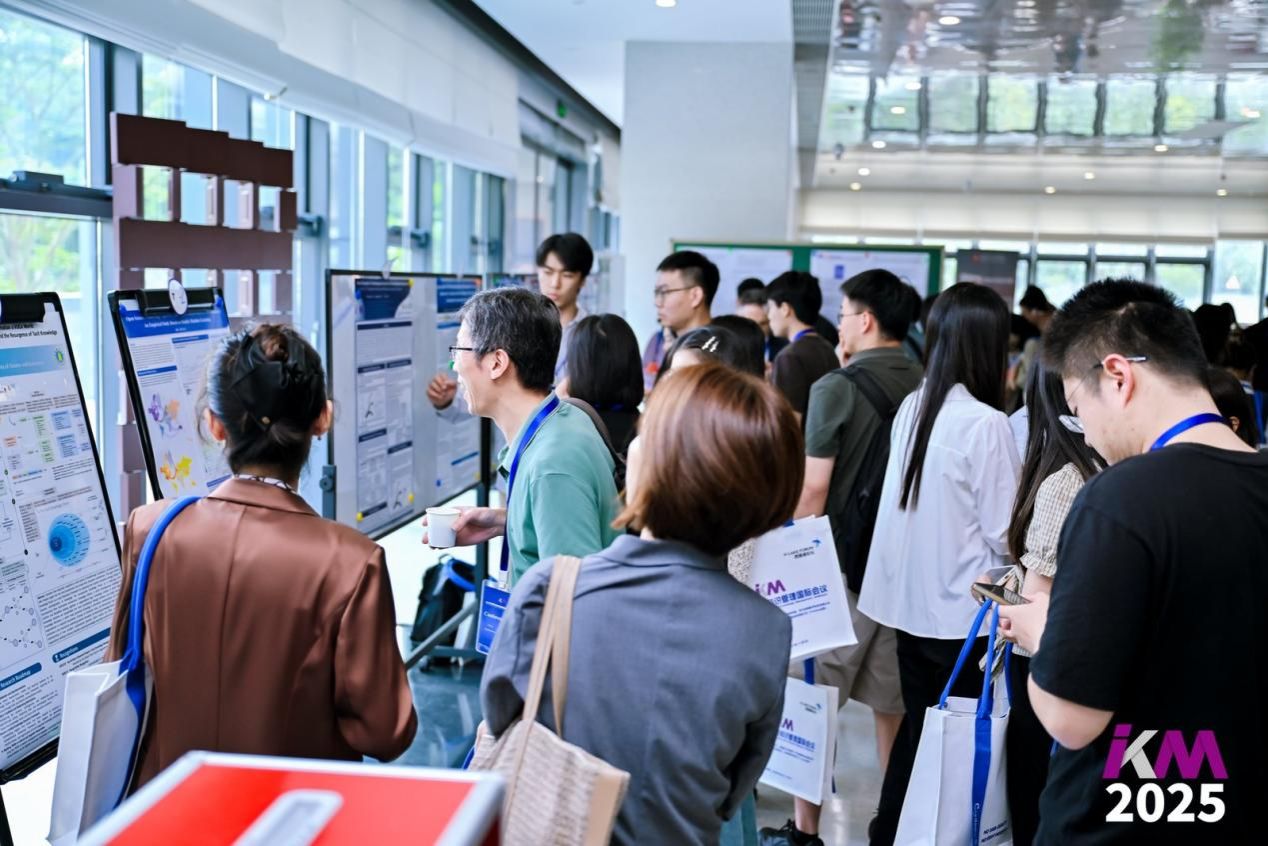
The academic salon focused on "PoC development and University Tech Transfer". Hosted by Li Linling, in charge of the Innovation and Entrepreneurship Office at The Chinese University of Hong Kong( Shenzhen), experts from top universities and technology transfer institutions—including Dr. Yu Fei from Tsinghua University, Wei Xinghua from Shenzhen University, and Wu Shuang from Shenzhen Research Institute of Shanghai Jiao Tong University—conducted practical discussions on key topics. These topics included the core functions and operation models of PoC, the challenges and solutions in university achievement transformation, and the construction of regional industry-university-research collaboration mechanisms.
The salon specially set up a thematic discussion session on the measurement indicators of scientific and technological achievement transformation. It aimed to build consensus and explore feasible solutions for solving the "first kilometer" problem of transforming scientific and technological achievements from the laboratory to the market.
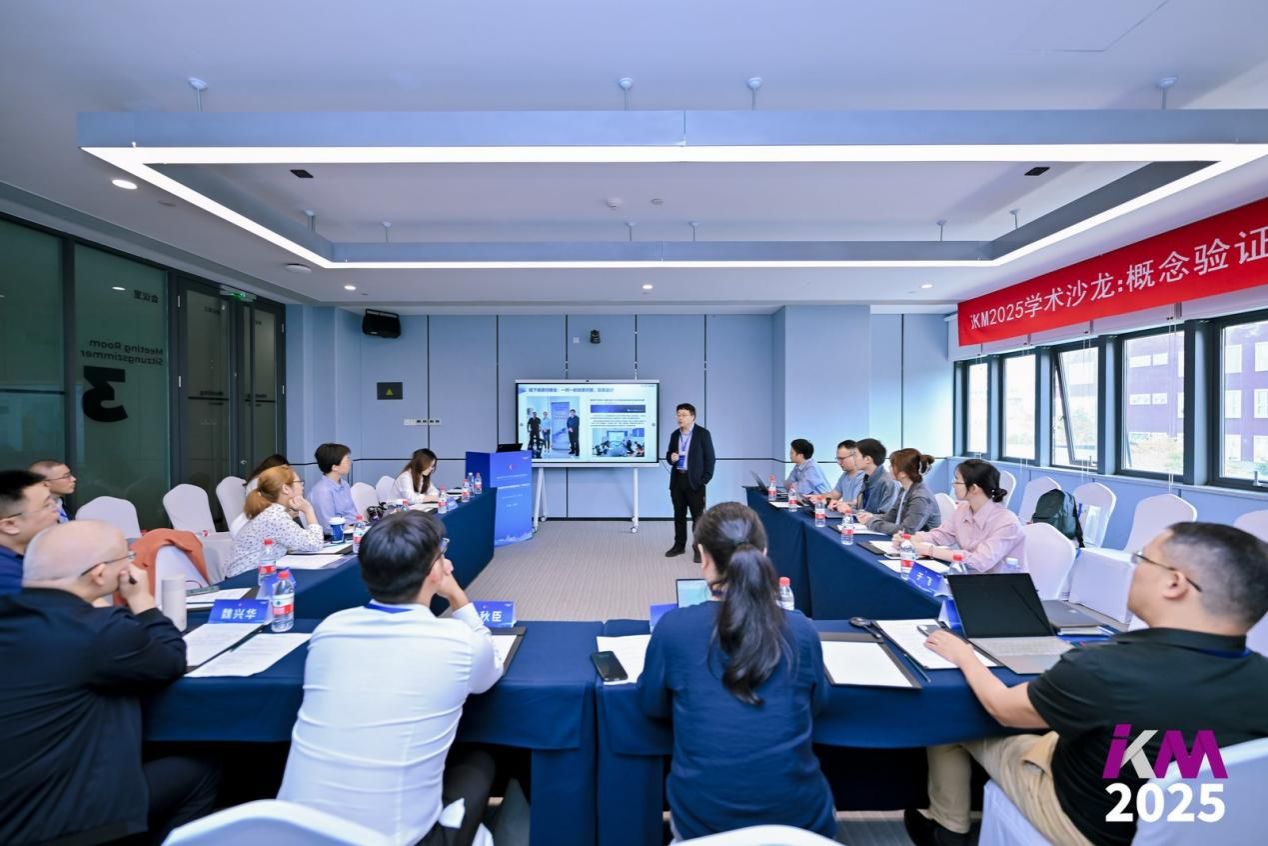
Academic Forum (I), themed "Knowledge Management and Innovation: From Past to Future", was hosted by Professor Krishna Venkitachalam from Ajman University in the United Arab Emirates. The forum was full of profound theoretical thinking and an international perspective.S cholars from universities at home and abroad, including Fudan University andYunnanUniversity[GL2] of Finance and Economics, conducted in-depth reflections and forward-looking analyses on the discipline of knowledge management from theoretical and historical dimensions. The topics of the scholars' reports were extensive, covering how "outsiders" achieve innovation through knowledge fission, the research path of responsible knowledge capital, the dynamic relationship between fun and knowledge sharing in R&D teams, and the discussion on new paradigms of dynamic knowledge management.While sorting out the development context of knowledge management, the forum also pointed out a new direction for the discipline's role in the sustainable development of society in the future.
Academic Forum (II) centered on "Innovation and Knowledge Management in the AI Era" and was led by Professor Fu Xiaoqing from the University of Macau, focusing directly on the most globally concerned cutting-edge field. Scholars from Dalian University of Technology, Qinghai University, and Hangzhou Dianzi Universityetc. focused on topics such as how AI shapes enterprises' dynamic capabilities, the impact of AI-generated content on exploratory and exploitative innovation, new measurement standards for innovation management under generative AI knowledge flow, and how the integration of AI and industrial technology drives green value creation. The forum profoundly revealed that AI is reshaping the underlying logic of innovation and knowledge management.
Academic Forum (III), themed "Digitalization and Innovative Transformation of Modern Industries", was hosted by Professor Patarapong Intarakumnerd from the National Graduate Institute for Policy Studies (GRIPS) in Japan. This forum focused on the macro landscape and in-depth mechanisms of digital transformation. Researchers from universities including Zhejiang University, Sichuan University, and Chongqing University approached the topic from diverse perspectives. They conducted research on issues such as how the characteristics of university knowledge repositories affect their position in patent cooperation networks, the social transformation mechanism of disruptive technological innovation, the core competency development model of chief masters with Chinese characteristics, and the innovation diffusion behavior of household consumers in enterprise-led innovation communities. These studies provide multi-level theoretical frameworks and empirical evidence for understanding how digitalization profoundly influences and reshapes the structure and innovation models of modern industries.
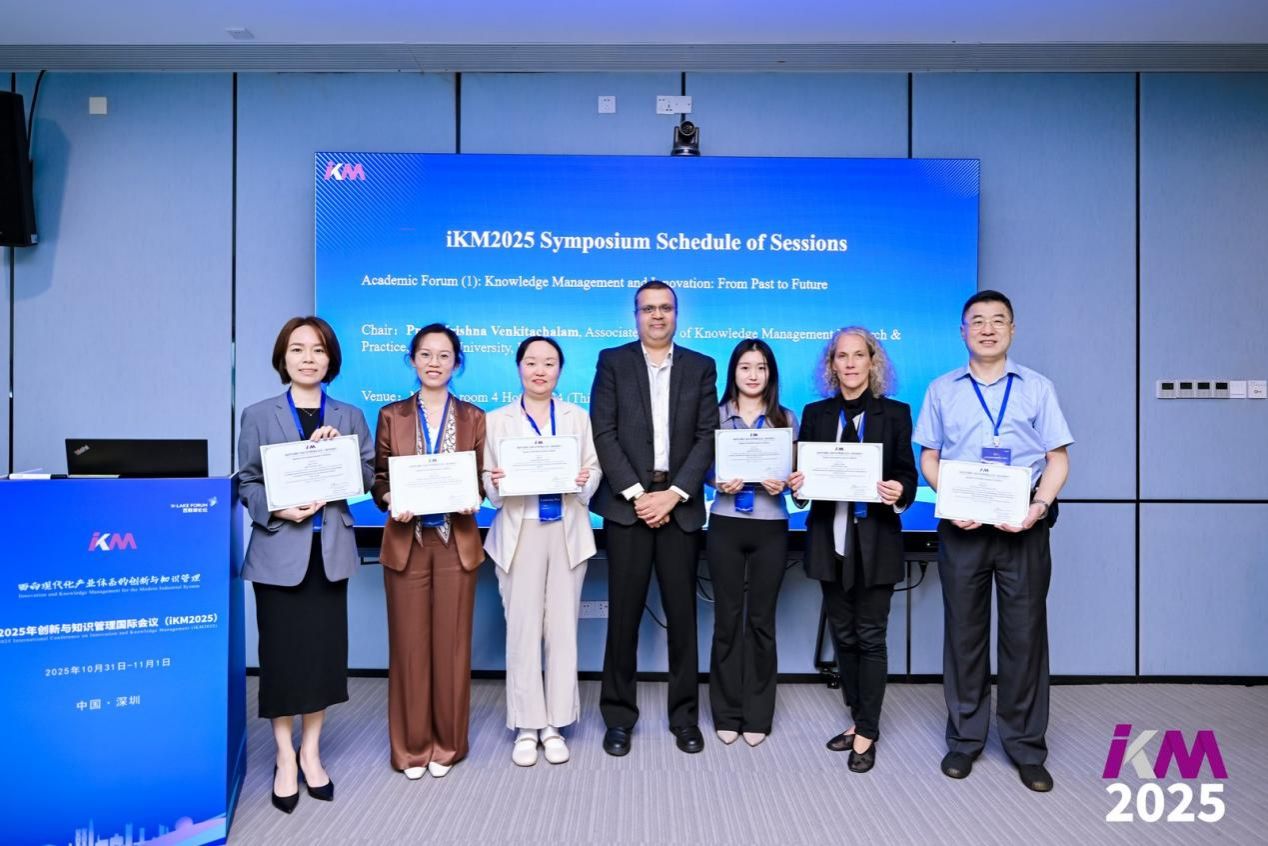
In the second day of the 2025 International Conference on Innovation and Knowledge Management (iKM2025) through keynote speech, meeting editors, outstanding achievement awards, and the closing ceremony, the conference concluded successfully. Scholars, practitioners, and journal editors from around the world gathered to discuss the future directions of knowledge management, technological innovation, and academic development.
Keynote Speech (II)
This session was hosted by Dr. Ke Chunxiao, Deputy General Manager of CNKI, and invited two international experts to share cutting-edge insights.
Professor Eric Tsui from The Hong Kong Polytechnic University delivered a speech titled "Technologies for Knowledge Creation and Learning for the Modern Industry System". He emphasized the integrated application of artificial intelligence, gamification, and extended reality (XR) technologies in knowledge creation. He also demonstrated the "Socratic Playground for Learning" platform developed by his team. This platform supports multilingual personalized teaching and enables a paradigm shift from "searching for knowledge" to "proactively constructing knowledge" through interactive Q&A and scenario simulation, making it particularly suitable for lifelong learning scenarios in enterprises and universities.
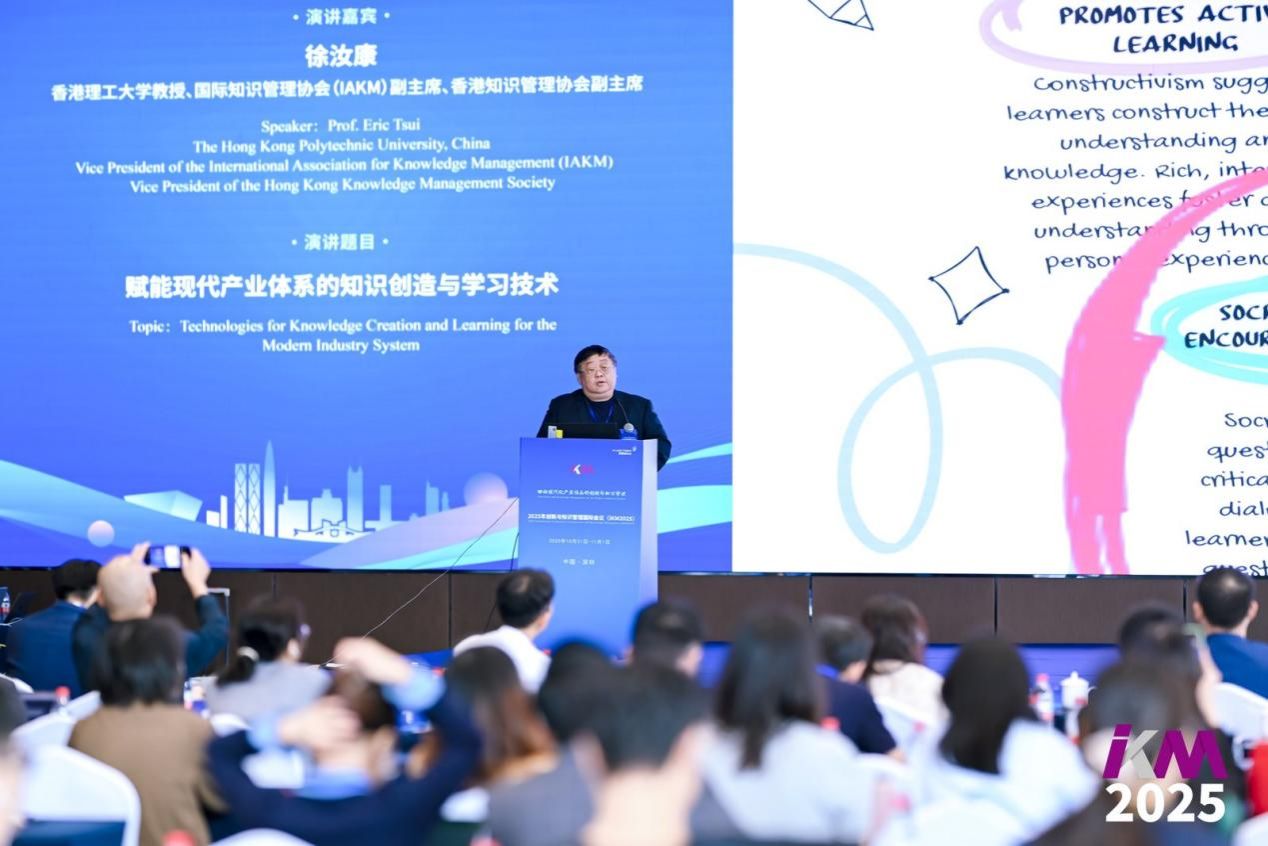
Professor Eric Tsui from The Hong Kong Polytechnic University delivers a keynote speech
Associate Professor Vincent Ribiere from Bangkok University in Thailand delivered his speech titled "Practical Lessons from Global MIKE Award Winners: Turning Knowledge into Innovation". Based on a survey of 21 award-winning enterprises worldwide, he pointed out that successful enterprises generally integrate knowledge management with innovation strategies deeply, and systematically manage intellectual capital through three dimensions: "human capital, relational capital, and structural capital". In addition, more than 90% of the award-winning enterprises plan to increase their knowledge management budgets, which confirms the continuing importance of knowledge management in the digital era.
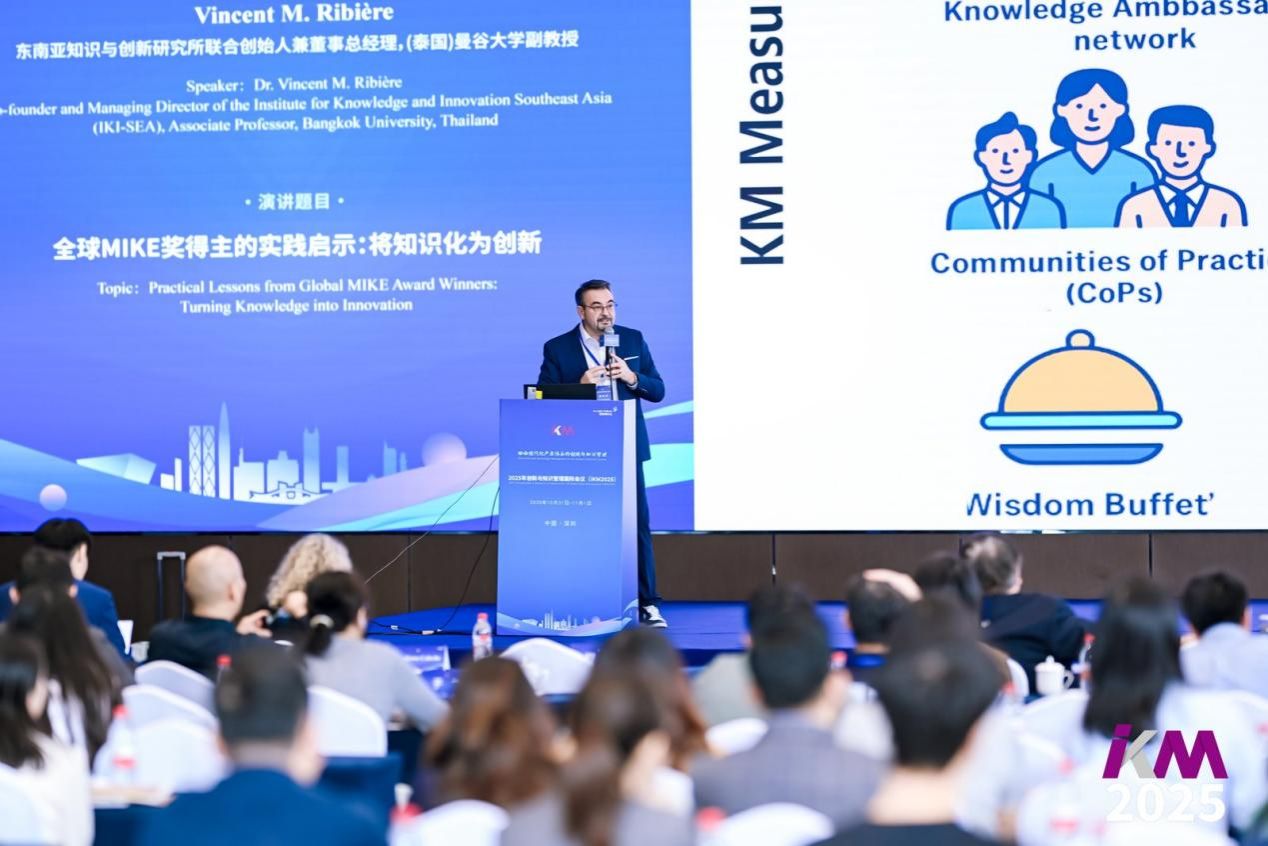
Associate Professor Vincent Ribiere from Bangkok University in Thailand delivers a keynote report.
Meeting editors
This session was hosted by Associate Professor Liu Gang, Chair of the Conference Program Committee from Shenzhen Technology University. Editors from well-known journals provided in-depth analysis of research trends and academic standards:
Dr. Yan Yan, Director of the Editorial Office of The Journal of Management World, introduced the journal’s development over 40 years since its founding. She emphasized that the journal focuses on "Chinese issues and important practices" and implements a full-process double- blinded review system to ensure fairness and impartiality.
Professor Chen Jin, Associate Editor of Technovation and from Tsinghua University, pointed out that Chinese scholars need to improve the rigor of theoretical frameworks and critical thinking in their submissions. He also encouraged them to read more classic monographs and conduct in-depth corporate case studies.
Professor Krishna Venkitachalam, Associate Editor of Knowledge Management Research & Practice, and Professor Patarapong Intarakumnerd, Editor-in-Chief of Asian Journal of Technology Innovation, both emphasized that research must balance "academic rigor" and "practical relevance". They also called for the diversification of methodologies and in-depth integration of contextual factors.
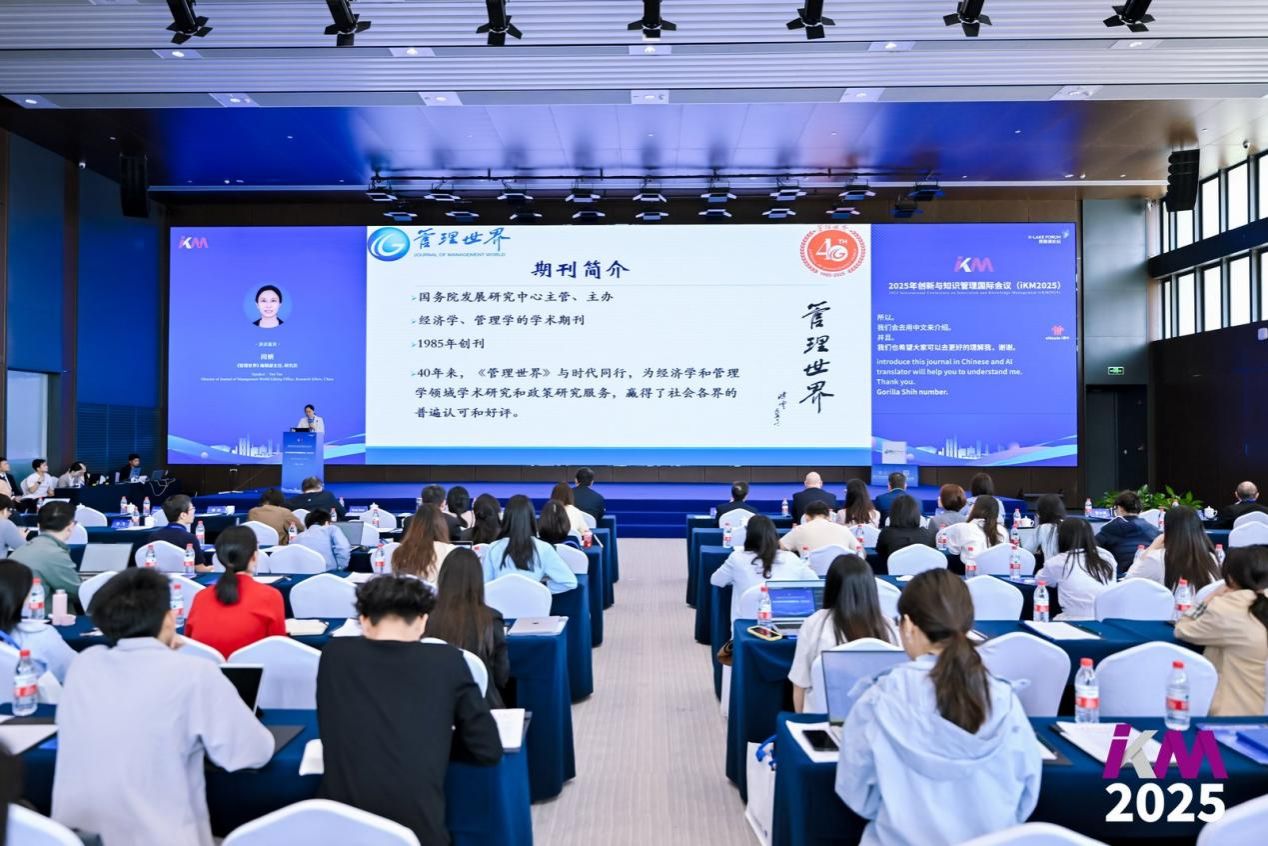
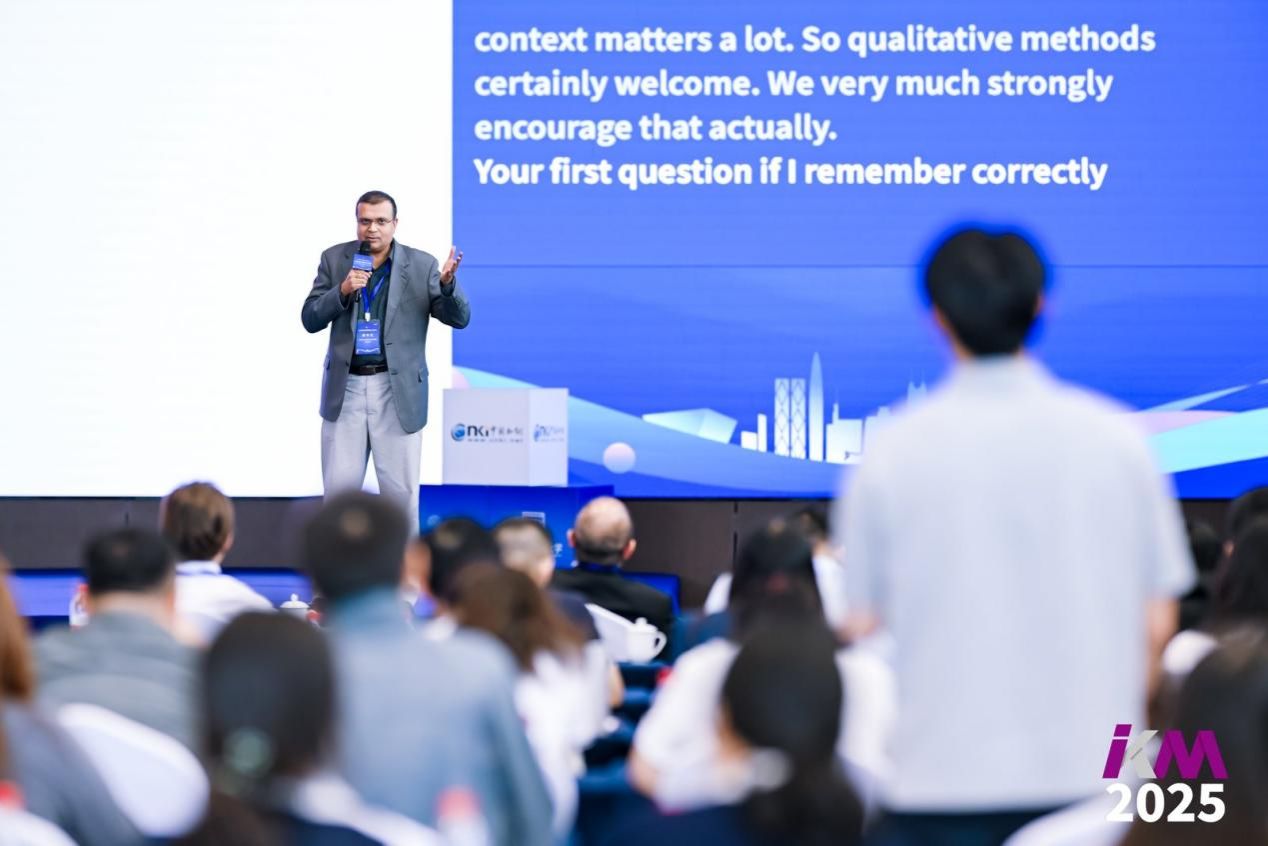
Excellent Achievements and Academic Poster Awards Presentation
Hosted by Wang Xiaodong, Deputy General Manager of CNKI Digital Technology, the conference announced the winners of the 5th Innovation and Knowledge Management Excellent Cases and the Best Academic Poster Awards.
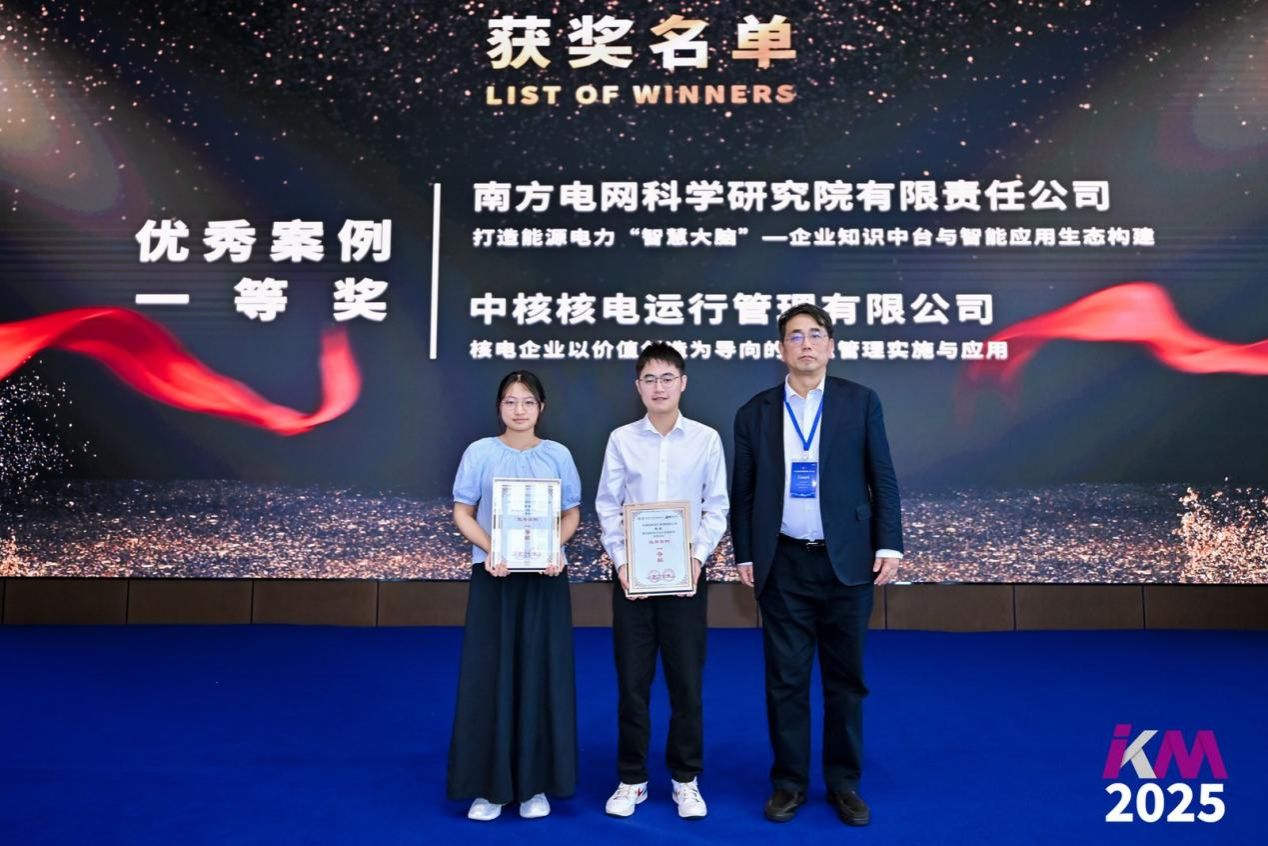
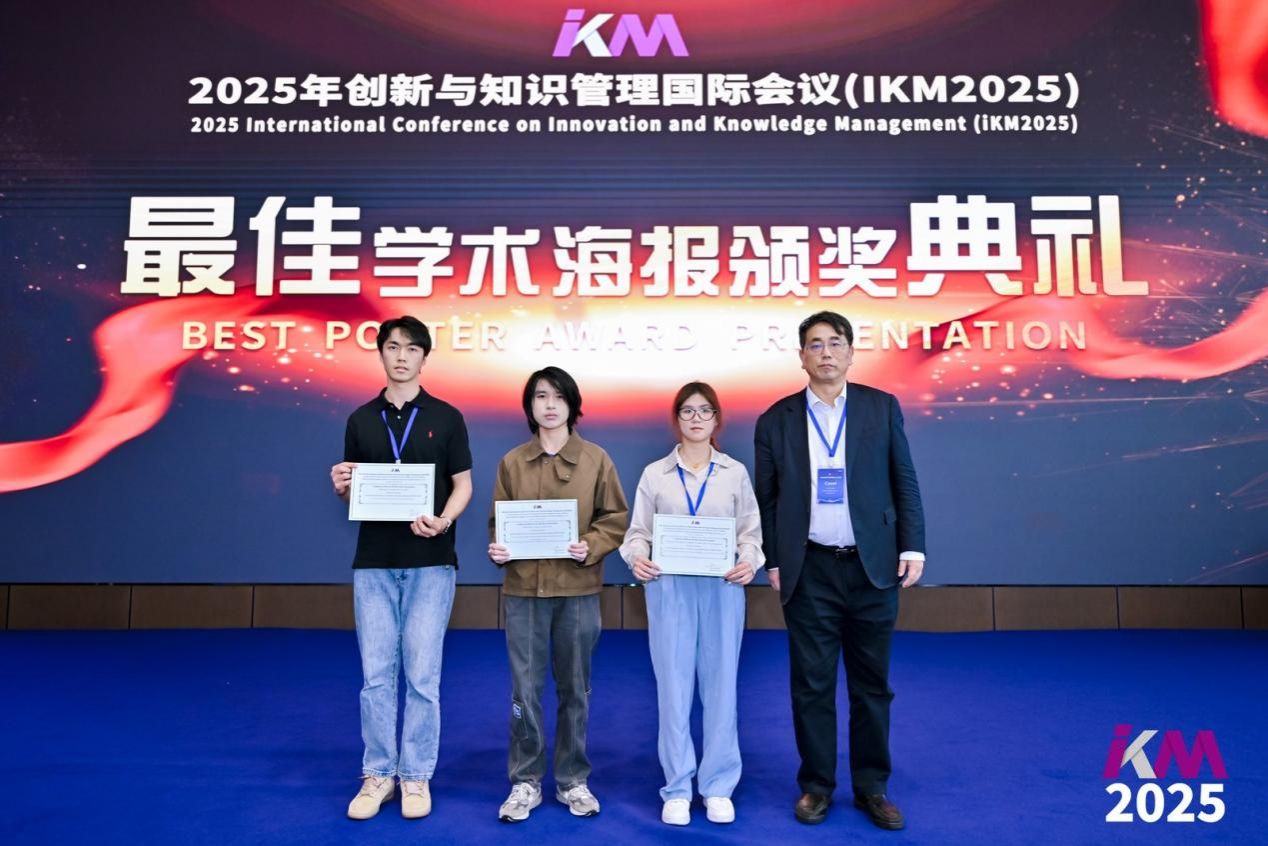
Closing Ceremony
The closing ceremony was hosted by Professor Cheng Yun, Vice Dean of the Business School at Shenzhen Technology University. Professor Holger Haldenwang, Dean of the Business School at Shenzhen Technology University, delivered a closing speech via video. He pointed out that "knowledge has become the intersection of people, organizations, and technology" and called on the academic and industrial communities to jointly build an innovation ecosystem. Professor Chen Jin, Chair of the Conference from Tsinghua University, summarized that iKM2025 had successfully built a three-dimensional dialogue platform of "academia-industry-policy". He also announced that the next conference is planned to be held in Hong Kong, aiming to continue promoting international collaboration in innovation and knowledge management.
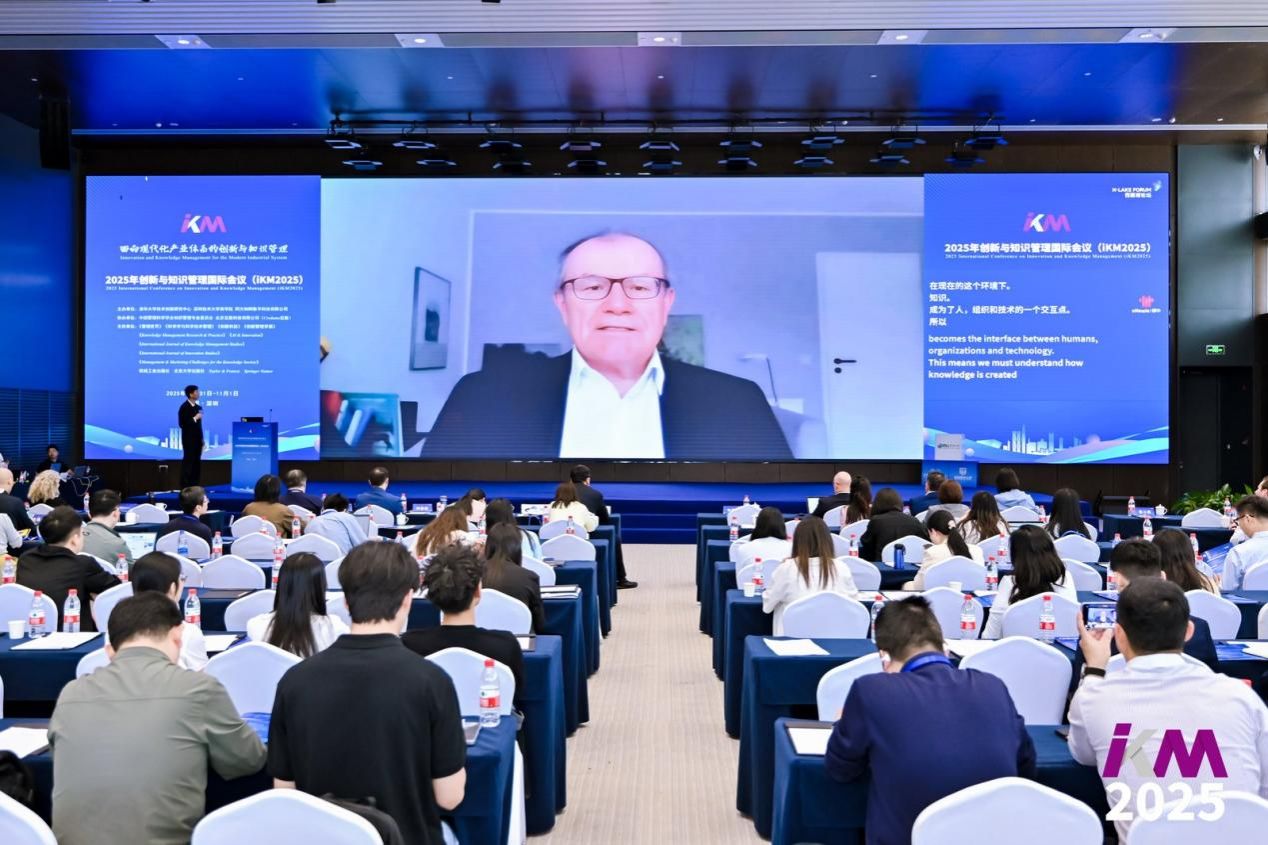
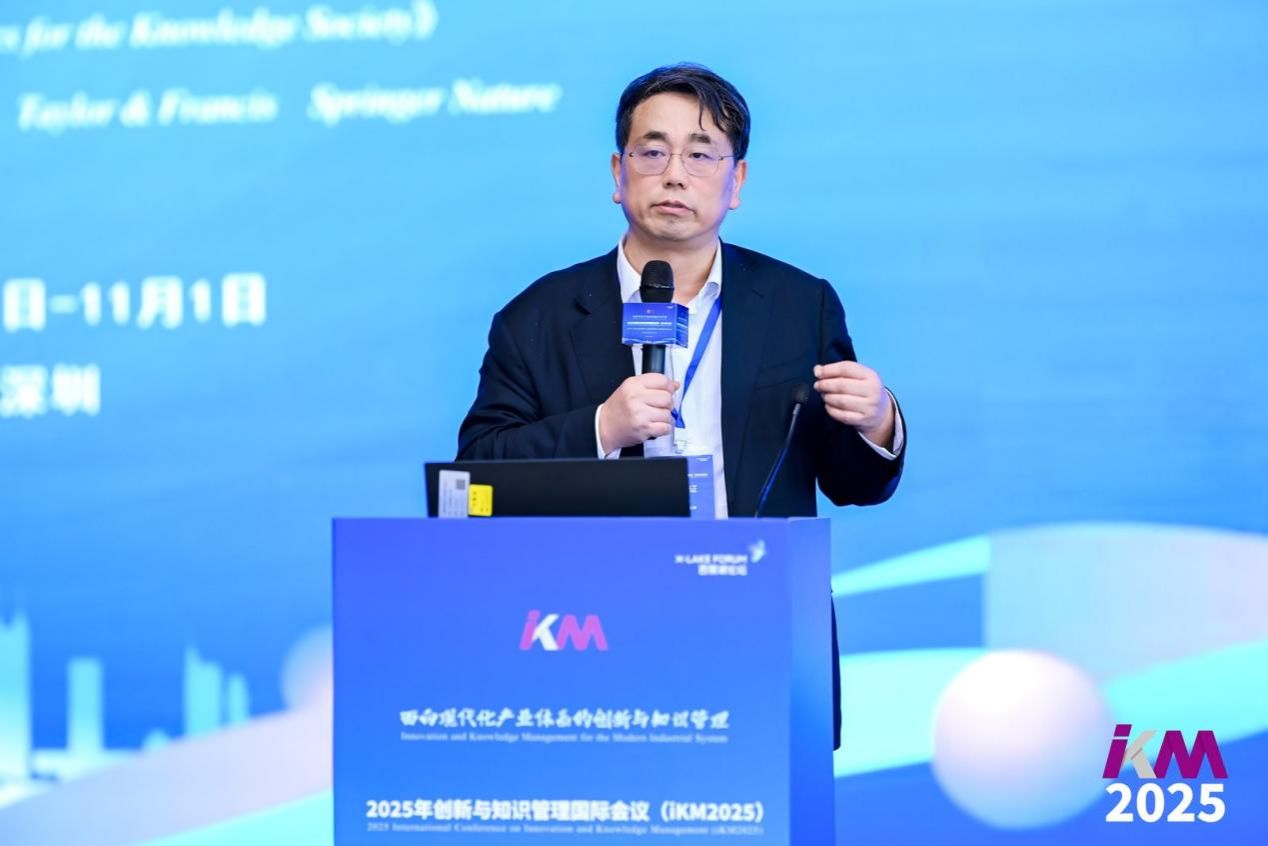
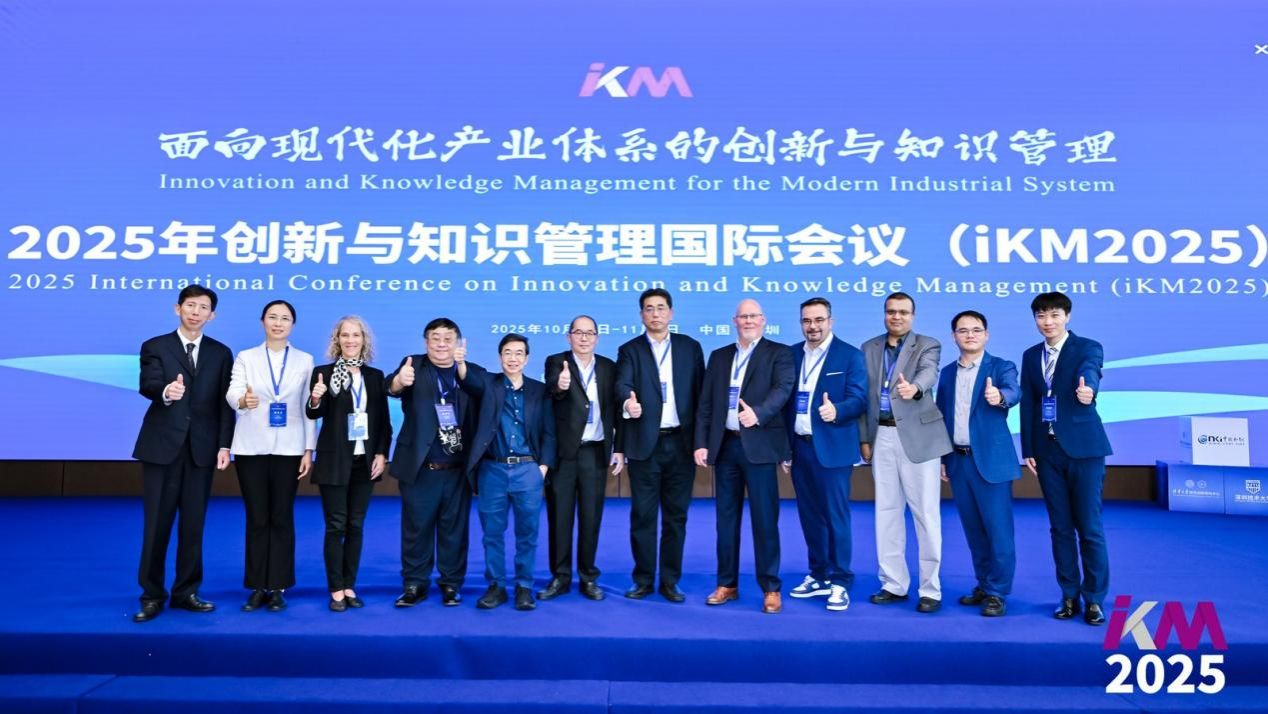
The 2025 International Conference on Innovation and Knowledge Management (iKM2025) concluded successfully at Shenzhen Technology University. With the theme " Innovation and Knowledge Management for the Modern Industrial System ", this conference brought together top experts, scholars, and practitioners from around the world. They conducted in-depth discussions on cutting-edge topics such as innovation paradigms in the AI era, new mindsets for knowledge management, and industrial digital transformation. Through cross-field and cross-regional ideological exchanges, the conference provided new ideas and paths for the development of a modern industrial system, and contributed important insights to promoting industrial innovation and upgrading.
Context: LIN Xiaoyu
Review: CHENG Yun, LIU Gang